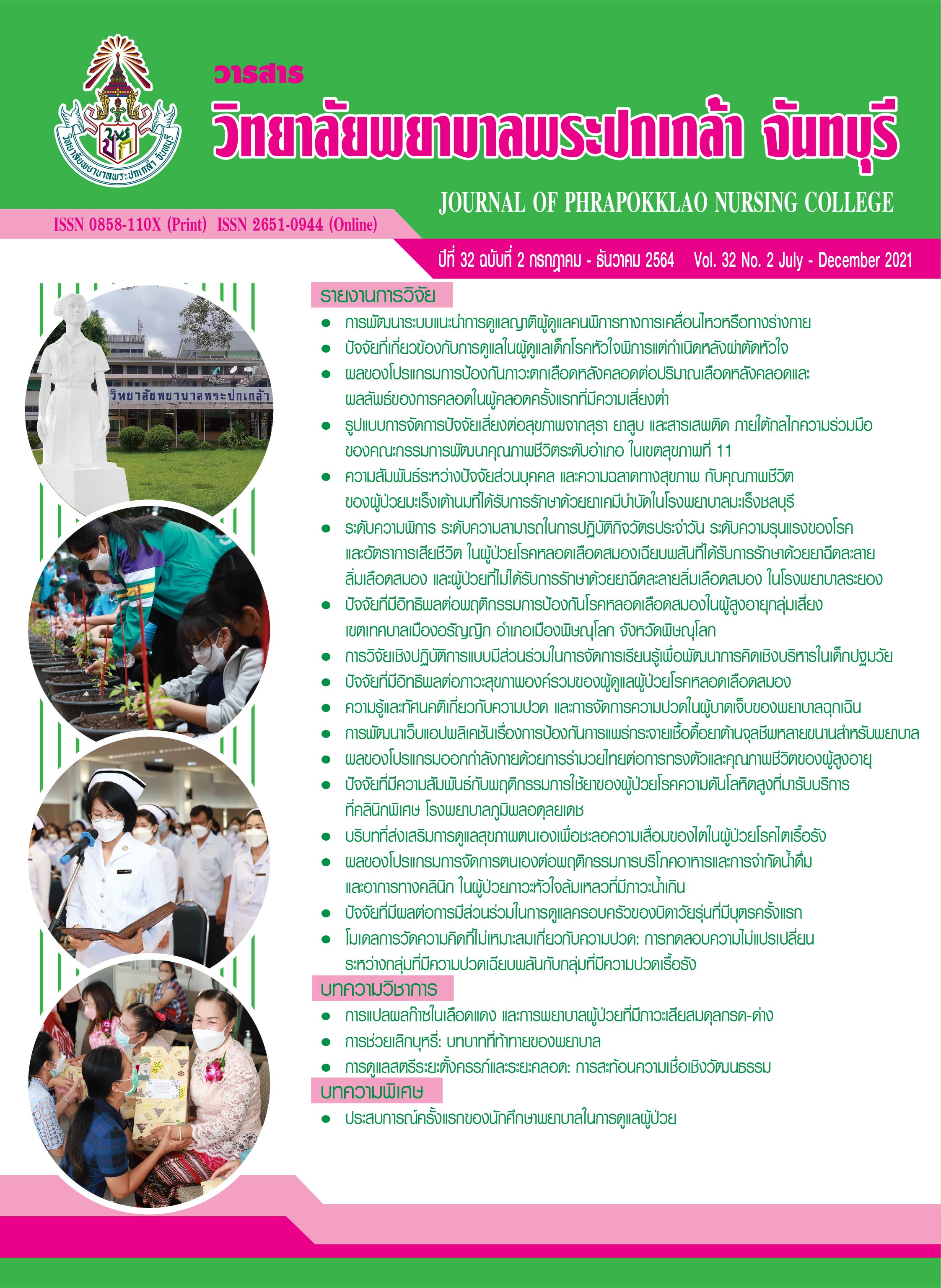ปัจจัยที่มีผลต่อการมีส่วนร่วมในการดูแลครอบครัวของบิดาวัยรุ่นที่มีบุตรครั้งแรก
คำสำคัญ:
บิดาวัยรุ่น, การมีส่วนร่วมในการดูแลครอบครัวของบิดาบทคัดย่อ
การวิจัยครั้งนี้เป็นการวิจัยแบบหาความสัมพันธ์เชิงทำนาย เพื่อศึกษาการมีส่วนร่วมในการดูแลครอบครัว และปัจจัยที่มีผลต่อการมีส่วนร่วมในการดูแลครอบครัวของบิดาวัยรุ่นที่มีบุตรครั้งแรก กลุ่มตัวอย่างเป็นบิดาวัยรุ่นที่มีบุตรครั้งแรกที่ภรรยาตรวจสุขภาพหลังคลอดที่คลินิกวางแผนครอบครัว โรงพยาบาลนครปฐมและโรงพยาบาลราชบุรี รวมจำนวน 119 คน เครื่องมือการวิจัยประกอบด้วย แบบสอบถามข้อมูลส่วนบุคคล แบบสอบถามประสบการณ์การได้รับการเลี้ยงดูจากบิดา มีค่าความเชื่อมั่น .81 แบบวัดความมั่นใจในการเป็นบิดาที่ดี แบบสอบถามสัมพันธภาพระหว่างคู่ครอง มีค่าความเชื่อมั่น .84 แบบสอบถามความเครียด มีค่าความเชื่อมั่น .83 และแบบสอบถามการมีส่วนร่วมในการดูแลครอบครัว มีค่าความเชื่อมั่น .95 เก็บรวบรวมข้อมูลในช่วงเดือนธันวาคม 2561 ถึงเดือนสิงหาคม 2562 วิเคราะห์ข้อมูลด้วยสถิติความถี่ ร้อยละ ค่าเฉลี่ย ส่วนเบี่ยงเบนมาตรฐาน และการวิเคราะห์การถดถอยพหุคูณแบบมาตรฐาน
ผลการวิจัยพบว่า บิดาวัยรุ่นที่มีบุตรครั้งแรกมีคะแนนเฉลี่ยการมีส่วนร่วมในการดูแลครอบครัวเท่ากับ 3.14 (SD = .30) ประสบการณ์การได้รับการเลี้ยงดูจากบิดา ความมั่นใจในการเป็นบิดาที่ดี สัมพันธภาพระหว่างคู่ครอง และความเครียด ร่วมกันอธิบายการมีส่วนร่วมในการดูแลครอบครัวคิดเป็น ร้อยละ 18.40 (R2 = .184, p < .001) แต่มีตัวแปรเพียง 2 ตัวแปร ที่มีผลต่อการมีส่วนร่วมในการดูแลครอบครัวอย่างมีนัยสำคัญทางสถิติ โดยตัวแปรที่มีผลมากที่สุด คือ สัมพันธภาพระหว่างคู่ครอง (Beta = .345, p < .01) รองลงมา คือ ความมั่นใจในการเป็นบิดาที่ดี (Beta = .182, p < .05)
จากการวิจัยครั้งนี้มีข้อเสนอแนะว่า พยาบาลแผนกหลังคลอดควรประเมินบิดาวัยรุ่นเกี่ยวกับสัมพันธภาพระหว่างคู่ครองและความมั่นใจในการเป็นบิดาที่ดี เพื่อเป็นแนวทางในการช่วยเหลือให้บิดาวัยรุ่นมีสัมพันธภาพที่ดีกับคู่ครองและมีความมั่นใจในการเป็นบิดาที่ดี นำไปสู่การมีส่วนร่วมในการดูแลครอบครัวของบิดาวัยรุ่น
เอกสารอ้างอิง
กรมสุขภาพจิต. (2559). แบบสอบถามความเครียด (ST-5). สืบค้นจาก http://www.dmh.go.th/test/qtest5/
ชลดา สติปัญ, พรรณพิไล ศรีอาภรณ์, และนันทพร แสนศิริพันธ์. (2559). สัมพันธภาพระหว่างคู่สมรส ความรักใคร่ผูกพันระหว่างบิดากับทารก และการเข้ามามีส่วนร่วมของบิดาในระยะหลังคลอด. พยาบาลสาร, 43(พิเศษ), 71–81.
ชไมพร ใจแปง. (2555). ปัจจัยทางจิตสังคมที่เกี่ยวข้องกับการแสดงบทบาทการเป็นบิดาของบิดาที่มีบุตรอายุ 2–5 ปี ในจังหวัดนครศรีธรรมราช (ปริญญานิพนธ์ปริญญามหาบัณฑิต). กรุงเทพฯ: มหาวิทยาลัยศรีนครินทรวิโรฒ.
นิศาชล รักสกุล, พรรณพิไล ศรีอาภรณ์, และนันทพร แสนศิริพันธ์. (2562). ปัจจัยทำนายการเข้ามามีส่วนร่วมของบิดาในผู้เป็นบิดาครั้งแรกในระยะหลังบุตรเกิด. วารสารการพยาบาลและการดูแลสุขภาพ, 37(3), 144–153.
บุญฤทธิ์ สุขรัตน์. (2557). การตั้งครรภ์ในวัยรุ่น: นโยบาย แนวทางการดำเนินงาน และติดตามประเมินผล (พิมพ์ครั้งที่ 2). นนทบุรี: สำนักอนามัยการเจริญพันธุ์ กรมอนามัย.
ประเวศน์ มหารัตน์สกุล. (2557). หลักการและวิธีการเขียนงานวิจัย วิทยานิพนธ์ สารนิพนธ์. กรุงเทพฯ: ปัญญาชน.
ศุภกร ไชยนา. (2555). ความเครียด การสนับสนุนทางสังคม และการมีส่วนร่วมของบิดาในระยะหลังคลอด (วิทยานิพนธ์ปริญญามหาบัณฑิต). มหาวิทยาลัยเชียงใหม่.
ศุภกร ไชยนา, นันทพร แสนศิริพันธ์, และกรรณิการ์ กันธะรักษา. (2558). ความเครียด การสนับสนุนทางสังคม และการเข้ามามีส่วนร่วมของบิดาในระยะหลังคลอด. พยาบาลสาร, 42(1), 85–96.
สำนักงานปลัดกระทรวงการพัฒนาสังคมและความมั่นคงของมนุษย์. (2556). สภาวะการมีบุตรของวัยรุ่นไทย. สืบค้นจาก http://www.m-society.go.th
สำนักงานปลัดกระทรวงการพัฒนาสังคมและความมั่นคงของมนุษย์. (2557). สภาวะการมีบุตรของวัยรุ่นไทย. สืบค้นจาก http://www.m-society.go.th
แสงเดือน ศิริพร. (2559). ปัจจัยทำนายการมีส่วนร่วมของบิดาในระยะหลังบุตรเกิด (วิทยานิพนธ์ปริญญามหาบัณฑิต). มหาวิทยาลัยเชียงใหม่.
Authentic Masculinity. (2018). The five responsibilities of a father. Retrieved from https://authenticmasculinity.com/responsibilities-of-a-father/
Bandura, A. (1977). Social Learning Theory. New York: General Learning Press.
Brown, G. L., Kogan, S. M., & Kim, J. (2018). From fathers to sons: The intergenerational transmission of parenting behavior among African American young men. Family Process, 57(1), 165–180. doi:10.1111/famp.12273
Chu, H. S., & Lee, H. (2019). Relationship between paternal psychological distress and involvement in childcare among fathers of preschool-aged children: Mediating effect of maternal psychological distress. BMC Pediatrics, 19(308). Retrieved from https://bmcpediatr.biomedcentral.com/articles/10.1186/s12887-019-1688-z
Cohen, J. (1988). Statistical power analysis for the behavioral sciences (2nd ed.). New York: Erlbaum.
Faul, F., Erdfelder, E., Buchner, A., & Lang, A. G. (2014). G* Power Version 3.1.9.2. Germany: University of Kiel.
Gershy, N., & Omer, H. (2017). Engaging fathers in parent training: A qualitative study. Journal of Family Psychotherapy, 28(1), 38–58. doi:10.1080/08975353.2017.1283143
Goodall, J., & Montgomery, C. (2014). Parental involvement to parental engagement: A continuum. Educational Review, 66(4), 399–410. Retrieve from https://doi.org/10.1080/00131911.2013.781576
Hayward-Everson, R. A., Honegger, L., Glazebrook, A., Rabeno., S., & Yim, K. (2018). Predictors of father involvement in a sample of low-income men enrolled in a responsible fatherhood program. Social Work Research, 42(2), 84–94. doi:10.1093/swr/svy004
Hofferth, S. L., Pleck, J. H., & Vesely, C. K. (2012). The transmission of parenting from fathers to sons. Parenting: Science and Practice, 12(4), 282–305. doi:10.1080/15295192.2012.709153
Karami, M. (2017). Re: What’s the minimum sample needed for reliability check ?. Retrieved from https://www.researchgate.net/post/Whats_the_minimum_sample_needed_for_reliability_check/58a20b333d7f4b99233b6498/citation/download
Kroll, M. E., Carson, C., Redshaw, M., & Quigley, M. A. (2016). Early father involvement and subsequent child behaviour at ages 3, 5, and 7 years: Prospective analysis of the UK millennium cohort study. PLoS One, 11(9), 1–17. doi:10.1371/journal.pone.0162339
Kwok, S., Ling, C. C. Y., Leung, C. L. K., & Li, J. C. M. (2013). Fathering self-efficacy, marital satisfaction, and father involvement in Hong Kong. Journal of Child and Family Studies, 22(8), 1051–1060. doi:10.1007/s10826-012-9666-1
Lamb, M. E. (Ed.). (2004). The role of the father in child development (4th ed.). New York: John Wiley & Sons.
Lewin, A., Mitchell, S. J., Waters, D., Hodgkinson, S., Southammakosane, C., & Gilmore, J. (2015). The protective effects of father involvement for infants of teen mothers with depressive symptoms. Maternal and Child Health Journal, 19(5), 1016–1023. doi:10.1007/s10995-014-1600-2
Matlakala, F. K., Makhubele, J. C., & Mashilo, M. W. (2018). Challenges of teenage fathers towards fatherhood in Vaalbank, Mpumalanga Province. Gender & Behaviour, 16(3), 12013–12020.
Milkie, M. A., & Denny, K. E. (2014). Changes in the cultural model of father involvement: Descriptions of benefits to fathers, children, and mothers in parents’ magazine, 1926–2006. Journal of Family Issues, 35(2), 223–253. doi:10.1177/0192513X12462566
Murshid, N. S. (2016). Mothers’ empowerment and father involvement in child health care in Bangladesh. Children and Youth Services Review, 68, 17–23. doi:10.1016/j.childyouth.2016.06.026
National Library of Medicine. (2020). Adolescent development. Retrieved from http://medlineplus.gov/ency/article/002003.htm
Nelson, K. (2014). The everything father-to-be book: A survival guide for men (3rd ed.). Avon, MA: Adams Media.
Trahan, M. H. (2018). Paternal self-efficacy and father involvement: A bi-directional relationship. Psychology of Men & Masculinity, 19(4), 624–634. doi:10.1037/men0000130
Twamley, K., Brunton, G., Sutcliffe, K., Hinds, K., & Thomas, J. (2013). Fathers’ involvement and the impact on family mental health: Evidence from Millennium Cohort Study Analyses. Community, Work & Family, 16(2), 212–224. doi:10.1080/13668803.2012.755022
ดาวน์โหลด
เผยแพร่แล้ว
รูปแบบการอ้างอิง
ฉบับ
ประเภทบทความ
สัญญาอนุญาต
ลิขสิทธิ์ (c) 2021 วารสารวิทยาลัยพยาบาลพระปกเกล้า จันทบุรี

อนุญาตภายใต้เงื่อนไข Creative Commons Attribution-NonCommercial-NoDerivatives 4.0 International License.
เนื้อความ ข้อมูล และรายการอ้างอิงที่ผู้เขียนใช้ในการเขียนบทความเพื่อลงตีพิมพ์ในวารสารวิทยาลัยพยาบาลพระปกเกล้า จันทบุรี ถือเป็นความคิดเห็นและความรับผิดชอบของผู้เขียน คณะผู้จัดทำวารสารไม่จำเป็นต้องเห็นพ้องด้วยหรือร่วมรับผิดชอบ
บทความที่ได้รับการลงตีพิมพ์ในวารสารวิทยาลัยพยาบาลพระปกเกล้า จันทบุรี ถือเป็นลิขสิทธิ์ของวารสารวิทยาลัยพยาบาลพระปกเกล้า จันทบุรี หากหน่วยงานหรือบุคคลใดต้องการนำส่วนหนึ่งหรือทั้งหมดของบทความไปเผยแพร่ต่อเพื่อวัตถุประสงค์ใด ๆ จะต้องได้รับอนุญาตจากบรรณาธิการวารสารก่อน



